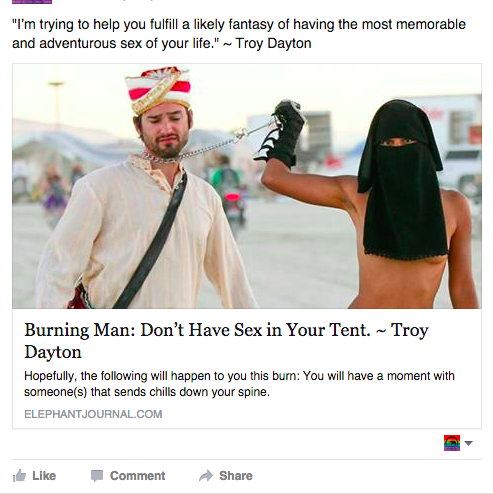
[Author’s Note: This piece offers a small portion of the discussion we’ve been having at elephant journal with regards to free speech. It could not possibly hope to represent the opinion of elephant journal as a whole, as we are made up of unique individuals with differing outlooks on this subject. I offer you one slice, in the hope that it may provide a more intimate understanding of the care we take to honor our mission—and perhaps to leave space if you wish to join the dialogue.]
How does mindful journalism do free speech?
(Spoiler alert: It’s not an ultimatum.)
When is being offensive useful, and when is it just insensitive, unkind or lacking compassion?
In elephant’s mission to be of benefit and serve our global community, what does it mean to be mindful without being PC?
You may think it’s all sunshine and rainbows back here in elephant-land, but in our cozy warren of Skype chat rooms, these are the issues we’re tackling on a regular basis.
An incident on our Facebook page a couple days ago has brought these questions to the fore, and we’ve been seeing a lively and (I feel) productive discourse between editors.
I wanted to share some of that discussion with you, our readers, firstly because it’s a fascinating debate, isn’t it? And secondly because it is oh so relephant to our times—just Google search “free speech in the news,” or “Charlie Hebdo free speech,” or “journalism and censorship in the news,” and you’ll see what I mean.
It all started with an article about Burning Man—and a good, mindful article, I’ll add!—which appeared on our Facebook page accompanied by an image of two classically NSFW burners: a man dressed in vaguely “Arab” garb (I use that term knowing full well it is as inaccurate as the costume) and a half-naked woman with a black hijab covering her face, holding the other end of the chain looped around the man’s neck. For the purpose of clarity, you will find a screenshot of the post at the top of this article.
I was working when the backlash hit. We received a handful of very angry complaints from readers expressing outrage at the image (the symbols of the get-up were—to them and me—overtly referencing Islam); they found it distasteful, insensitive and offensive.
They wanted it taken down.
When I looked at the post, I had to agree. I felt offended, too. I had a feeling plenty of my friends would have also been offended. I complied with the requests to remove the post, and then I shared my feelings with my colleagues:
“This post received a lot of outrage over the cultural insensitivity of the featured image—people found it distasteful and offensive. And you know what? I agree! This is offensive. It is the definition of “titillating.” Let’s not be Charlie Hebdo and offend people simply because we can—not if it doesn’t serve a defensible, important purpose, which… I don’t think this article about sex at burning man falls into that category.”
Our fearless leader, Waylon Lewis, had much to say in response. Just the highlights:
“Just because it’s enshrined by a religion or culture or interpretation of either, I don’t think we need to bow down to it… we criticize theism, say. But we have to do so kindly, fairly. Censorship is not fine… It’s your average moment at Burning Man. I don’t expect to understand your average foreign image or an image from another culture—but I also don’t expect to get to be so offended by it I want it taken down.
We are not PC. We never will be. We will however be mindful and offensive. As Trungpa Rinpoche pointed out, the truth offends the ego.”
And a bit from other editors:
“I don’t personally find it offensive, but I can see how many others would. I don’t think it’s a problem/entirely avoidable that we sometimes offend some people and while I think we should maintain our trouble-making roots, there are certain areas (culturally sensitive ones especially) where we might want to tread a little more, not lightly, but mindfully.”
“An image of people at BM (Burning Man) might be offensive, it’s true! I see that it’s intro’d with context and the title makes it clear that it’s BM. So yeah, people will be offended when they take an image out of context. But including relevant info re: context keeps it mindful.”
“It seems that the core mission of EJ is to become a global publication, and we are gaining a lot of momentum with this, especially in India and Australia. So, that being the case—as editors we should consider what a global response would be.”
You could say that our little internal dialogue is a microcosm of the current global discourse on free speech. We’re not down with censorship, but we want to be compassionate, and we’re asking where the line is—or perhaps, if there is a line at all.
Salman Rushdie (whose writing I love and whose voice I respect), wrote in the New York Times following the Charlie Hebdo attack in January of this year:
“Both John F. Kennedy and Nelson Mandela use the same three-word phrase which in my mind says it all, which is, ‘Freedom is Indivisible,'” he said. “You can’t slice it up, otherwise it ceases to be freedom. You can dislike Charlie Hebdo… But the fact that you dislike them has nothing to do with their right to speak.”
I would add this: Yes, they have their right to speak, and I have my right not to repeat what they say if I don’t feel there is a good reason for doing so.
Basically, you have a right to say what you want to say.
(Although, we censor hate speech. We tell our children to be kind. We tell ignorance to sit down and shut up and listen before butting its head in. Don’t we?)
I have a right to be offended—or not. And I have a right to listen—or not listen—if I don’t like what you have to say.
Finally, we as journalists—no, we as mindful humans working in media—have a right to selectively publish words, images and ideas that offend, or not.
And we want to offend you.
That is, we want to make you angry.
Anger is good. Anger makes us think and it challenges us.
We want to challenge you.
We do not, however, want to be ruthlessly insensitive. We do not wish to disrespect, nor is it ever our intention to cause harm.
In Ashtanga yoga (the eight-limbed path) we speak of putting ahimsa (non-harming) before satya (truth).
In Anthropology, we endlessly pit cultural relativism (there is no absolute truth) against universal human rights, and it’s fascinating, but hard, but fascinating. There’s not a simple answer—not when you really get into it. (Or maybe for you there is!)
To paraphrase Gloria Steinhem, the truth will piss you off. But, in our case, I don’t believe the truth should cause true pain.
That’s a finer line than you might think.
For the offended party, there’s a fine line, too. Am I offended because I’m being challenged—because this person’s opinion’s are so far out of line with my own and I’m choosing to take offense rather than respond with power? Or am I offended because this content is deeply hurtful?
Salman Rushdie, on the topic of his famously controversial book The Satanic Verses,
“When asked if he thinks his book genuinely upsets people, Salman Rushdie said ‘The world is full of things that upset people. But most of us deal with it and move on and don’t try and burn the planet down. There is no right in the world not to be offended. That right simply does not exist.’” ~ The Hindu
My, my, the plot thickens.
As mentioned, I do not represent all of elephant journal when I share my outlook on this issue. I could not hope to do so, as we are a company comprised of 19 (not including our hundreds of writers!) individuals, each with their own unique interpretation of what it means to live mindfully. What it means to tread with intention, compassion and awareness through the muddy waters of modern journalism. What it means to be of benefit.
I could have responded differently, as per Waylon’s insightful suggestion, like this:
“Hey, my name is Toby, and we here at elephant disagree with one another, but free speech is important. I personally hate this image, and my friends would be offended by it. But we do not delete what we hate— “I disapprove of what you say, but I will defend to the death your right to say it.” ~ Evelyn Beatrice Hall”
Food for thought.
The debate is ongoing, and as we expand in a global direction, I expect it will be a debate we revisit many times.
In short, on the one hand, free speech is everything, and we must defend that freedom. We will fight to the death for our right to say what we want to say. Period.
But then, on the other hand, what about the ethics of journalism that require us to do no harm?
We support free speech to the fullest; however, before we share something that might offend—that might hurt—shouldn’t we also ask:
“Is it true?
Is it necessary?
Is it kind?”
~ not The Buddha
I say yes.
But oh, that is a slippery line to walk. Very slippery indeed.
Wouldn’t you agree?
~
Relephant Reads:
Je Ne Suis Pas Charlie.
A Reminder of Elephant’s Mission: Journalism vs. mere Blogging.
~
Author: Toby Israel
Photo: Author’s Own // Flickr/Cliff
~
Relephant Bonus Video on Journalism//Walk the Talk Show








Read 7 comments and reply